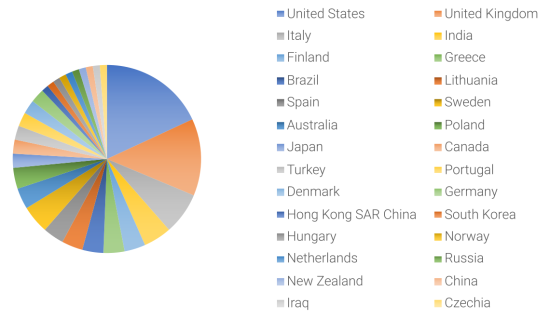Search Articles
Journal:
all
Keyword:
building sustainability
Total
—
46 articles
Article 7 Aug 2023
Karina Cagarman, Kristina Fajga and Jan Kratzer
4087 Views1333 Downloads4 Citations
Article 21 Jul 2023
Nikolaos Partarakis, Effrosini Karouzaki, Stavroula Ntoa, Anastasia Ntagianta, Emmanouil Zidianakis and Constantine Stephanidis
Highlights of Sustainability
Volume 2 (2023), Issue 3, pp. 138–156
Volume 2 (2023), Issue 3, pp. 138–156
4496 Views1089 Downloads1 Citations
Article 14 Jun 2023
Małgorzata Polkowska
Space tourism is recreational space travel, whether by government vehicles, such as the Russian Soyuz and the International Space Station (ISS), or by vehicles built by private companies. Since the flight of the world’s first space
Space tourism is recreational space travel, whether by government vehicles, such as the Russian Soyuz and the International Space Station (ISS), or by vehicles built by private companies. Since the flight of the world’s first space tourist, American businessman Dennis Tito (28 April 2001), space tourism (orbital) has been slowly growing. Orbital space tourism is very expensive, so a number of private companies have decided to concentrate on building much cheaper suborbital vehicles, designed to take passengers to altitudes of up to 100 km. On 4 October 2004, SpaceShipOne, funded by Virgin Galactic and designed by an American engineer, won the X Prize and, in doing so, ushered in a new era of commercial crewed spaceflight and space tourism. Since then, the design and construction of suborbital spacecraft have become increasingly popular. Such ships, in principle, do not have the ability to cross the imaginary 100 km boundary and enter the Cosmos area. However, space tourists can find themselves weightless for a few minutes. In fact, not only technical but legal difficulties have caused suborbital tourism to develop at a slow pace so far. This article concentrates on some legal challenges regarding space tourism, not going into details about states’ politics and international organizations’ activities.
or
Access Full Article
Highlights of Sustainability
Volume 2 (2023), Issue 2, pp. 100–109
Volume 2 (2023), Issue 2, pp. 100–109
4067 Views3630 Downloads
Article 18 May 2023
Larry Dwyer
Highlights of Sustainability
Volume 2 (2023), Issue 2, pp. 83–99
Volume 2 (2023), Issue 2, pp. 83–99
10546 Views6740 Downloads14 Citations
Review 8 May 2023
Annette Toivonen
Highlights of Sustainability
Volume 2 (2023), Issue 2, pp. 75–82
Volume 2 (2023), Issue 2, pp. 75–82
6097 Views4548 Downloads5 Citations
Article 2 May 2023
Floros Flouros
Highlights of Sustainability
Volume 2 (2023), Issue 2, pp. 62–74
Volume 2 (2023), Issue 2, pp. 62–74
3512 Views1484 Downloads
Article 13 Apr 2023
Thomas Krabokoukis
Highlights of Sustainability
Volume 2 (2023), Issue 2, pp. 50–61
Volume 2 (2023), Issue 2, pp. 50–61
5254 Views1064 Downloads5 Citations
Commentary 24 Feb 2023
Ada Rocha and Cláudia Viegas
Food service comprises the production of meals consumed outside the home, including consumers from all age groups and in different sectors, such as schools (from kindergarten to university), public and private companies, the health sector (from
Food service comprises the production of meals consumed outside the home, including consumers from all age groups and in different sectors, such as schools (from kindergarten to university), public and private companies, the health sector (from hospitals to elderly care institutions), military, sports facilities and restaurants (from fine dining to fast-food). Food service units (FSU) achieved importance and responsibility not only for feeding the population but also as an important setting for public health interventions, potentially educating consumers and modulating behaviours through the meals provided. In addition to its socioeconomic impact, the food service industry has a strong environmental impact. More sustainable food service starts with the basics: minimizing environmental impact by reducing carbon footprint. Food service industry is being encouraged to make choices that positively impact the environment. Nevertheless, most of the efforts and research made in the last years have been focused on evaluating and reducing food waste. This article focuses on strategies that could be implemented beyond food waste, and act on changing the food offer towards health and sustainability while promoting consumers’ behaviour change.
or
Access Full Article
Highlights of Sustainability
Volume 2 (2023), Issue 1, pp. 10–15
Volume 2 (2023), Issue 1, pp. 10–15
5005 Views1597 Downloads2 Citations
Short Note 10 Feb 2023
Simone Pettigrew and Leon Booth
Highlights of Sustainability
Volume 2 (2023), Issue 1, pp. 1–9
Volume 2 (2023), Issue 1, pp. 1–9
3462 Views1238 Downloads1 Citations
Editorial 22 Dec 2022
Highlights of Sustainability Editorial Office
Highlights of Sustainability
Volume 1 (2022), Issue 4, pp. 253–254
Volume 1 (2022), Issue 4, pp. 253–254
3206 Views628 Downloads

Volume 2 (2023), Issue 3, pp. 171–184